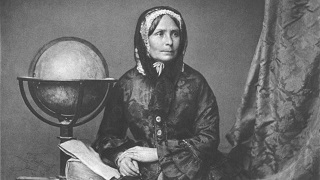De Amerikaanse dichteres, essayiste, critica en feministe Katha Pollitt werd geboren op 14 oktober 1949 in New York. Zie ook alle tags voor Katha Pollit op dit blog.
The Old Neighbors
The weather’s turned, and the old neighbors creep out
from their crammed rooms to blink in the sun, as if
surprised to find they’ve lived through another winter.
Though steam heat’s left them pale and shrunken
like old root vegetables,
Mr. and Mrs. Tozzi are already
hard at work on their front-yard mini-Sicily:
a Virgin Mary birdbath, a thicket of roses,
and the only outdoor aloes in Manhattan.
It’s the old immigrant story,
the beautiful babies
grown up into foreigners. Nothing’s
turned out the way they planned
as sweethearts in the sinks of Palermo. Still,
each waves a dirt-caked hand
in geriatric fellowship with Stanley,
the former tattoo king of the Merchant Marine,
turning the corner with his shaggy collie,
who’s hardly three but trots
arthritically in sympathy. It’s only
the young who ask if life’s worth living,
notMrs. Sansanowitz, who for the last hour
has been inching her way down the sidewalk,
lifting and placing
her new aluminum walker as carefully
as a spider testing its web. On days like these,
I stand for a long time
under the wild gnarled root of the ancient wisteria,
dry twigs that in a week
will manage a feeble shower of purple blossom,
and I believe it: this is all there is,
all history’s brought us here to our only life
to find, if anywhere,
our hanging gardens and our street of gold:
cracked stoops, geraniums, fire escapes, these old
stragglers basking in their bit of sun.
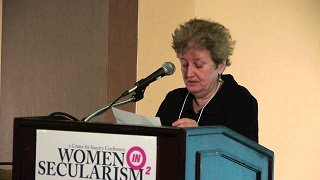
Katha Pollitt (New York, 14 oktober 1949)
De Nieuw-Zeelandse schrijfster Katherine Mansfield werd geboren op 14 oktober 1888 in Wellington. Zie ook alle tags voor Katherine Mansfield op dit blog.
Uit: The Journey To Bruges
“All the beauty and artificial flower of France had removed their hats and bound their heads in veils. A number of young German men, displaying their national bulk in light-coloured suits cut in the pattern of pyjamas, promenaded. French family parties—the female element in chairs, the male in graceful attitudes against the ship’s side—talked already with that brilliance which denotes friction! I found a chair in a corner against a white partition, but unfortunately this partition had a window set in it for the purpose of providing endless amusement for the curious, who peered through it, watching those bold and brave spirits who walked “for’ard” and were drenched and beaten by the waves. In the first half-hour the excitement of getting wet and being pleaded with, and rushing into dangerous places to return and be rubbed down, was all-absorbing. Then it palled—the parties drifted into silence. You would catch them staring intently at the ocean—and yawning. They grew cold and snappy. Suddenly a young lady in a white woollen hood with cherry bows got up from her chair and swayed over to the railings. We watched her, vaguely sympathetic. The young man with whom she had been sitting called to her.
“Are you better?” Negative expressed.
He sat up in his chair. “Would you like me to hold your head?”
“No,” said her shoulders
“Would you care for a coat round you? … Is it over? … Are you going to remain there?”… He looked at her with infinite tenderness. I decided never again to call men unsympathetic, and to believe in the allconquering power of love until I died—but never put it to the test. I went down to sleep.
I lay down opposite the old lady, and watched the shadows spinning over the ceilings and the wave-drops shining on the portholes.
In the shortest sea voyage there is no sense of time. You have been down in the cabin for hours or days or years. Nobody knows or cares. You know all the people to the point of indifference. You do not believe in dry land any more—you are caught in the pendulum itself, and left there, idly swinging. The light faded.”
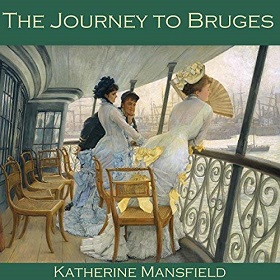
Katherine Mansfield (14 oktober 1888 – 9 januari 1923)
Cover
De Duitse dichteres, schrijfster en filosofe Margarete Susman werd geboren op 14 oktober 1872 in Hamburg. Zie ook alle tags voor Margarete Susman op dit blog.
Uit: Neue Gedichte
Es wachen in der toten Stadt die Feuer —
Die Brunnen schlafen und die Wolken stehn. I
n schweren Nebeln starb das letzte Wehn —
Doch wachen in der toten Stadt die Feuer.
Nun gehn wir zwei mit hohlen leisen Schritten,
Du führst mich, eine Waise, an der Hand,
Es blieb kein Lebender in diesem Land —
Die Feuer brennen — und wir gehn inmitten.
Auch du musst ziehn. Mein Atem sucht dich scheuer.
Siehst du die Flammen, welche meine sind?
O rette, rette dein verlornes Kind.
Es wachen in der toten Stadt die Feuer.
*
Die Mittagsfrau geht durch den weissen Schein;
Ihre Augen glühen und starren,
Kein Hoffen darin, kein Harren,
Trostlose Erfüllung allein.
So kurz die Schatten — sie wagen kaum,
Sich hart an den Weg zu legen,
Das Herz pocht in kurzen Schlägen,
Kurz wiegt der Schlaf ohne Traum.
Die Mittagsfrau schreitet unverhüllt,
Muss alles wissen und sehen —
Sie siehet sich selber gehen —
Des Zaubers Ring ist erfüllt.

Margarete Susman (14 oktober 1872 – 16 januari 1966)
Hamburg
De Poolse schrijver Stefan Żeromski werd geboren op 14 oktober 1864 in Strawczyn in de buurt van Kielce. Zie ook alle tags voor Stefan Żeromski op dit blog.
Uit: The Coming Spring (Vertaald door Bill Johnston)
“These were canons and clauses of the will, imposed with a smile amid caresses. It was a despotic rule and an autocracy so firm that nothing, literally nothing, could overcome it. Now that iron band had loosened and fallen away of its own accord. The fearful panic in his mother’s eyes—“What will your father say?”—had disappeared. His father was gone from the apartment and from the world, and his absence said: “Do what you will!” This freedom delighted Czaruś. It terrified his mother. Houses of Glass 15 “What’s going to happen now?” she kept whispering as she wrung her hands. Cezary asked no such questions. He promised his mother he would be obedient, just as if his father were present in his study. He had decided to behave, and reassured his mother with a thousand tender caresses. But deep down, his soul and body were bursting to cut loose. What he couldn’t obtain from his mother with willful caprices, he wheedled out of her by charm or by making a scene. Now he got his own way. He did what he felt like. He no longer perceived the boundaries that he had previously been forbidden to cross, and he threw himself left and right, backwards and forwards—so as to take a good look at everything that before had been proscribed. He spent entire days away from home getting up to mischief with his pals, playing games, having adventures and prowling about. When the vacation ended he “attended” grammar school and as before he had French and German, English and Polish lessons at home; but now it was little more than a series of arguments , sometimes even fights. He locked horns with every one of his schoolteachers, started quarrels and conducted endless judicial proceedings, for he constantly experienced “injustices” and “wrongs” that, as a person of honor, he had to avenge in a manner that was both appropriate and recognized as such by the competent authorities, that is to say, his “old” chums in the fifth class.”
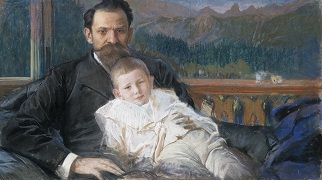
Stefan Żeromski (14 oktober 1864 – 20 november 1925)
Stefan Żeromski met zijn zoon door Leon Wyczółkowski, 1897
De Oostenrijkse schrijfster en wereldreizigster Ida Laura Pfeiffer werd geboren in Wenen op 14 oktober 1797. Zie ook alle tags voor Ida Pfeiffer op dit blog.
Uit: Reise einer Wienerin in das Heilige Land
“23. März 1842
Heute fuhren wir um sechs Uhr morgens ab. Gleich unterhalb Preßburg teilt sich die Donau in zwei Arme und bildet die sehr fruchtbare Insel Schütt, welche zehn Meilen lang und sechs Meilen breit ist. Die Gegend bis Gran ist ziemlich einförmig, dann aber wird sie hübscher. Schöne Hügel und mehrere Berge umschließen dieselbe und bringen Abwechslung ins Gemälde.
Gegen sieben Uhr abends kamen wir in Pest an. Schade, daß es schon ganz finster war. Die wunderschönen Häuser, man könnte sagen Paläste, welche das linke Ufer der Donau zieren, sowie gegenüber die altertümliche und berühmte Festung und Stadt Ofen gewähren einen herrlichen Anblick und verdienen einen längeren Aufenthalt. Ich blieb nur über Nacht, weil ich schon einige Jahre früher mehrere Tage in Pest zugebracht hatte.
Da hier das Dampfschiff gewechselt wird, muß man beim Landen vorzüglich auf jenes Gepäck achthaben, welches man zu Wien nicht im Bureau übergeben hat.
Ich stieg im Gasthof »Zum Jägerhorn« ab. Es ist ein höchst eleganter Ort, aber unverschämt teuer. Ein kleines Stübchen im Hof kostete über Nacht vierundfünfzig Kreuzer.
Schon diesen ganzen Tag war mir sehr unwohl. Heftige Kopfschmerzen, Fieberschauer und wiederholtes Erbrechen ließen mich eine Krankheit und Unterbrechung meiner Reise befürchten. Wahrscheinlich waren diese Übelkeiten eine Folge des schmerzlichen Abschieds von geliebten Freunden und der Veränderung der Luft. Ich konnte nur mühsam mein bescheidenes Kämmerchen erreichen und legte mich gleich zu Bett. Doch glücklich besiegte meine gute Natur all diese Feinde der Gesundheit, und ziemlich erholt begab ich mich des folgenden Tages am 24. März 1842
auf unser neues Dampfschiff, die »Galatha« von sechzig Pferdekräften, welche mir aber nicht so nett und niedlich vorkam wie die »Marianne«, die uns von Wien nach Pest geführt hatte.”
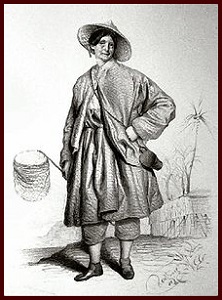
Ida Pfeiffer (14 oktober 1797 – 27 oktober 1858)
In reiskostuum op een lithografie door Adolf Dauthage
Onafhankelijk van geboortedata
De Duitse schrijver Philip Winkler werd in 1986 geboren in Neustadt am Rübenberge. Zie ook alle tags voor Philip Winkler op dit blog.
Uit: Hool
“Kai hebt seinen Arsch ein paar Zentimeter über den Sitz und fingert seine Puderdose aus der Gesäßtasche seiner Hollister-Jeans. Er schraubt sie auf und schaufelt sich ein Häufchen Koks auf den Daumen, hält ihn sich nacheinander unter die Nasenlöcher und snifft. Die Karre holpert ganz schön, aber er schafft es, dass nichts danebengeht. Er legt den Kopf zurück. Seine gegelte Boxerfrise schrappt über den fettigen Polsterbezug der Kopfstütze. Er hält mir die Dose hin.
»Auch was? Vielleicht machste dir dann mal nich’ in die Buchse.« Er grinst. Ich grinse zurück und sage: »Besser Hose voll als Nase voll, Herr Daum.« Er lacht. Schon lang her, dass ich mir irgendwas reingepfiffen habe. Während er die Dose zuschraubt, spreizt er den Mittelfinger ab. Von meinem Onkel kommt ein kehliges Räuspern. Kai zuckt die Schultern und schiebt die Dose zurück in seine Jeans. Er weiß ganz genau, dass Axel es nicht leiden kann, wenn wir uns vor einem Match mit irgendwas zuballern. Selbst Zeug wie Koks, das dir den Kopf klar macht. Aber das ist so eine Sache, die bekommt selbst Onkel Axel nicht aus den Leuten raus. Deswegen lässt er es meistens durchgehen, solange es niemand übertreibt. Ist ja selbst auch kein Kostverächter. Viele brauchen das gegen die Nervosität. Na ja, oder weil sie halt einfach Druffies sind. Aber wer sich nicht am Riemen reißen kann, den nimmt Axel nicht mit. Jedenfalls nicht auf wichtige Matches. Wie heute. Wenns wirklich drum geht, Hannover ehrenhaft zu vertreten. Kai ist zwar schon immer ordentlich dabei mit dem Koksen, aber er ist zu gut, um ihn zu Hause zu lassen. Die ganzen Pumperschränke wirken gegen ihn so wendig wie Planierraupen. Und dank mir hält er sich vor Matches etwas zurück. Außerdem weiß mein Onkel ganz genau, dass er nicht ständig mit mir rechnen könnte, wenn er Kai auf der Ersatzbank lassen würde.
Das gelbe Ortsschild von Olpe rauscht an der Beifahrerseite des T5 vorbei. Ich beuge mich vor, das Gesicht zwischen Hinkel und meinem Onkel.
»Jetzt gerade –«
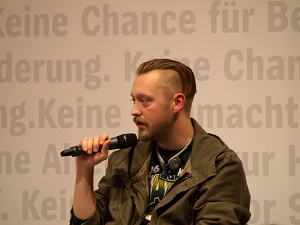
Philip Winkler (Neustadt am Rübenberge, 1986)

